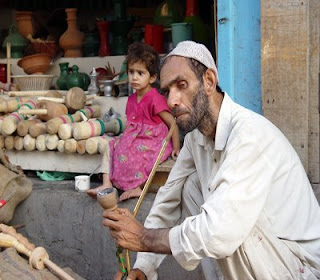We heard the news first on the All India Radio. Immediately afterwards, film songs were taken off air and one could only hear strains of Sitar.
Indira Gandhi, the daughter of Kashmir’s most worthy son, Jawaharlal Nehru, had been shot by her Sikh bodyguards.
I remember, father was about to leave for office. In the weak autumn sunshine I was playing my usual game of “Headquarters” – a game in which I would be an Indian soldier, destroying Karachi. Imagining worn-out Eveready battery cells as dynamite, connected by woolen thread, I brought the “enemy’s” port city to its knees almost every day.
And now, I loped after my father, who informed his brother about what he had heard on the radio and together they sat huddled, not knowing what to do. They kept on taking a name, which I had heard just a few months ago from father: Bhindranwale.
Many years ago, before I was born, father’s family had visited Amritsar where my father’s sister, who was a young girl then, was operated upon for an ailment. Among other things, father vividly remembered the serenity inside the sanctum sanctorum of the Golden temple and the piping hot paranthas which he had devoured in a dhaba. Upon Indira Gandhi’s directions, the army had laid siege to the temple, in June 1984, flushing out extremists led by Bhindranwale. I was eight years old.
In retaliation – I couldn’t figure out the connection then – some Muslim men, in order to show solidarity to the Sikhs, had stormed into the Hanuman temple, built on the banks of Jhelum, near one of the seven bridges, in Srinagar, and hurled the deity’s idol into the gushing waters below. It was a sad moment indeed, more so for me, since my sister and I would pass that temple every day, while on our way back to home from school, and, on every Tuesday, sister would buy boondi from her pocket money and offer it to the God. All this while, I would look at the sadhus, who assembled there, their bodies smeared with ash, and matted hair looking like pieces of rope, smoking their chillum.
More than an hour passed. The All India Radio said that Indira Gandhi was taken to the All India Institute of Medical Sciences; they said her condition was critical. My uncle looked at father. He was now turning the knob of the radio. After a few minutes, a crackling voice appeared. It belonged to a BBC news reader.
“Mrs. Indira Gandhi, India’s prime minister has died.”
I don’t remember whether father or uncle spoke after that. In the meantime, my sister came back from school. She was distraught; her friends, Mubina and Ghazala had danced on the road outside the school when they heard of the assassination. There was celebration everywhere in the valley.
The time had come to act, I thought. As the family sat glued around the Bush radio set, I sneaked into the kitchen garden. In a polythene bag, I collected raw tomatoes. They were my hand grenades. Tying the bag around my waist, I waited for “them.”
Hilal, our neighbour’s son and few years older to me, appeared on the wall dividing our house. He and his brothers would often sit on that wall, asking us to give them some apples from the tree in our garden.
“Can you sing Jana Gana Mana…?” I shouted at him.
He looked at me as if I had gone crazy. Then he spat at the flower bed beneath him, on our side.
I don’t know when my hand went to my waist and I began throwing a volley of tomatoes at him. One hit him in the eye and burst there. He was caught unawares. He let out a cry and fell backwards.
Soon, we would see images of a young Rahul, who had lost his grandmother, his arms clutched around his father who wore dark glasses.
In Delhi, meanwhile, a massacre had begun. Our old Sikh carpenter was devastated; his sister lived with her husband in a west Delhi colony. Later, we came to know that her husband was killed – a mob put a burning tyre, filled with petrol, around his neck like a garland.
Three days after Indira Gandhi died, my mother’s mother, who had turned senile in her old age, began to see visions of two men aiming at her with a gun. I had grown up hearing stories from her. There was a poster of Charlie Chaplin in my room, and, for many days after I had put it there, she would burn incense sticks in front of it, thinking Chaplin was Englishmen’s God.
On the fifth day, she passed away in her sleep.
In another five years, I would have to leave Charlie Chaplin behind. In another five years, we would be queuing up to receive tomatoes in relief camps.
After all, we were refugees now.

























